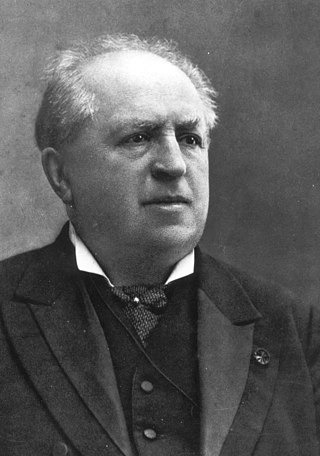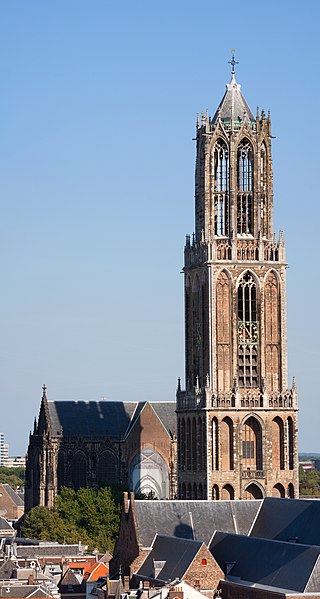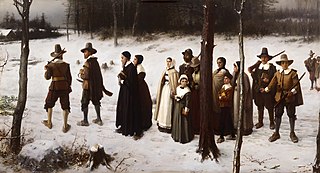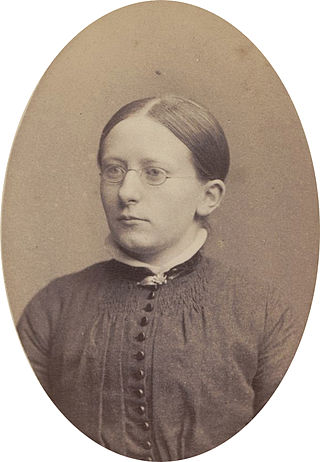
Calvinism, also sometimes called the Reformed tradition, Reformed Protestantism, Reformed Christianity, or simply Reformed, is a major branch of Protestantism that follows the Christian theological tradition and forms of Christian practice set down by John Calvin and other Reformation-era theologians. It emphasizes the sovereignty of God and the authority of the Bible.

A creed, also known as a confession of faith, a symbol, or a statement of faith, is a statement of the shared beliefs of a community in a form which is structured by subjects which summarize its core tenets.
The Protestant Church in the Netherlands is the largest Protestant denomination in the Netherlands, being both Calvinist and Lutheran.
Unitarianism is a Nontrinitarian branch of Christianity. Unitarian Christians affirm the unitary nature of God as the singular and unique creator of the universe, believe that Jesus Christ was inspired by God in his moral teachings and that he is the savior of humankind, but he is not comparable or equal to God himself.

Abraham Kuyper was the Prime Minister of the Netherlands between 1901 and 1905, an influential neo-Calvinist theologian and a journalist. He established the Reformed Churches in the Netherlands, which upon its foundation became the second largest Calvinist denomination in the country behind the state-supported Dutch Reformed Church.

The Christian Reformed Church in North America is a Protestant Calvinist Christian denomination in the United States and Canada. Having roots in the Dutch Reformed Church of the Netherlands, the Christian Reformed Church was founded by Dutch immigrants in 1857 and is theologically Calvinist.
The Dutch Reformed Church was the largest Christian denomination in the Netherlands from the onset of the Protestant Reformation in the 16th century until 1930. It was the original denomination of the Dutch Royal Family and the foremost Protestant denomination until 2004. It was the larger of the two major Reformed denominations, after the Reformed Churches in the Netherlands was founded in 1892. It spread to the United States, South Africa, Indonesia, Sri Lanka, Brazil, and various other world regions through Dutch colonization. Allegiance to the Dutch Reformed Church was a common feature among Dutch immigrant communities around the world and became a crucial part of Afrikaner nationalism in South Africa.
The Remonstrants is a Protestant movement that split from the Dutch Reformed Church in the early 17th century. The early Remonstrants supported Jacobus Arminius, and after his death, continued to maintain his original views called Arminianism against the proponents of Calvinism. Condemned by the synod of Dort (1618–1619), the Remonstrants remained in a small minority in the Netherlands. In the middle of the 19th century, the Remonstrant Brotherhood was influenced by the liberal Dutch theological movement.

The history of religion in the Netherlands has been characterized by considerable diversity of religious thought and practice. From 1600 until the second half of the 20th century, the North and West had embraced the Protestant Reformation and were Calvinist. The southeast was predominately Catholic. Associated with immigration from Arab world of the 20th century, Muslims and other minority religions were concentrated in ethnic neighborhoods in the cities.

The Reformed Churches in the Netherlands was the second largest Protestant church in the Netherlands and one of the two major Calvinist denominations along with the Dutch Reformed Church since 1892 until being merged into the Protestant Church in the Netherlands (PKN) in 2004. The PKN is the continuation of the Dutch Reformed Church, the Reformed Churches in the Netherlands and the Evangelical-Lutheran Church in the Kingdom of the Netherlands.

The Free Reformed Churches of North America (FRCNA) is a theologically conservative federation of churches in the Dutch Calvinist tradition with congregations in the United States and Canada. It officially adopted its current name in 1974.

Religion in the Netherlands was historically dominated by Christianity between the 10th and 20th centuries. In the late 19th century, roughly 60% of the population was Calvinist and 35% was Catholic. Since then, there has been a significant decline in both Catholic and Protestant Christianity, with Protestantism declining to such a degree that Catholicism became the foremost form of the Christian religion. The majority of the Dutch population is secular. A relatively sizable Muslim minority also exists.

Christianity is the most prevalent religion in the United States. Estimates from 2021 suggest that of the entire U.S. population about 63% is Christian. The majority of Christian Americans are Protestant Christians, though there are also significant numbers of American Roman Catholics and other Christian denominations such as Latter-day Saints, Orthodox Christians and Oriental Orthodox Christians, and Jehovah's Witnesses. The United States has the largest Christian population in the world and, more specifically, the largest Protestant population in the world, with nearly 210 million Christians and, as of 2021, over 140 million people affiliated with Protestant churches, although other countries have higher percentages of Christians among their populations. The Public Religion Research Institute's "2020 Census of American Religion", carried out between 2014 and 2020, showed that 70% of Americans identified as Christian during this seven-year interval. In a 2020 survey by the Pew Research Center, 65% of adults in the United States identified themselves as Christians. They were 75% in 2015, 70.6% in 2014, 78% in 2012, 81.6% in 2001, and 85% in 1990. About 62% of those polled claim to be members of a church congregation.

Religion in Suriname is characterized by a range of religious beliefs and practices due to its ethnic diversity. The government is vocally supportive of religious diversity and tolerance, and these attitudes are present in general society as well. According to the most recent census (2012), 48.4 percent of the population is Christian 22.3 percent is Hindu, 13.9 percent is Muslim, 1.8 percent follows Winti, and 0.8 percent is Kejawen. In addition 2.1 percent of the population follows other faiths, 7.5 percent are atheist or agnostic, and 3.2 percent did not answer the question about their religion.

Protestantism is a branch of Christianity that follows the theological tenets of the Protestant Reformation, a movement that began in the 16th century with the goal of reforming the Catholic Church from perceived errors, abuses, and discrepancies.

Protestantism is the largest grouping of Christians in the United States, with its combined denominations collectively comprising about 43% of the country's population in 2019. Other estimates suggest that 48.5% of the U.S. population is Protestant. Simultaneously, this corresponds to around 20% of the world's total Protestant population. The U.S. contains the largest Protestant population of any country in the world. Baptists comprise about one-third of American Protestants. The Southern Baptist Convention is the largest single Protestant denomination in the U.S., comprising one-tenth of American Protestants. Twelve of the original Thirteen Colonies were Protestant, with only Maryland having a sizable Catholic population due to Lord Baltimore's religious tolerance.

The Interkerkelijke Omroep Nederland (IKON) was a Dutch public broadcaster which made radio and television broadcasts on behalf of seven church communities. IKON also offered other services such as Teletekst, the IKON newspaper, the IKON pastorate and Internet. In IKON's airtime, the Wilde Ganzen collected money for projects in the Third World.

Nicolette Adriana Bruining was a Dutch theologian and founding president of the Liberal Protestant Radio Broadcasting Corporation (VPRO). She was also a teacher and humanitarian, assisting Jews during the Second World War. Her aid was acknowledged by the state of Israel, which posthumously awarded her as Righteous Among the Nations in 1990.

Emilie Knappert (1860–1952) was a Dutch social worker who founded several important social work organizations in the Netherlands, including the Leiden Volkshuis, and was the director of the Amsterdam School of Social Work from 1915 to 1926.















